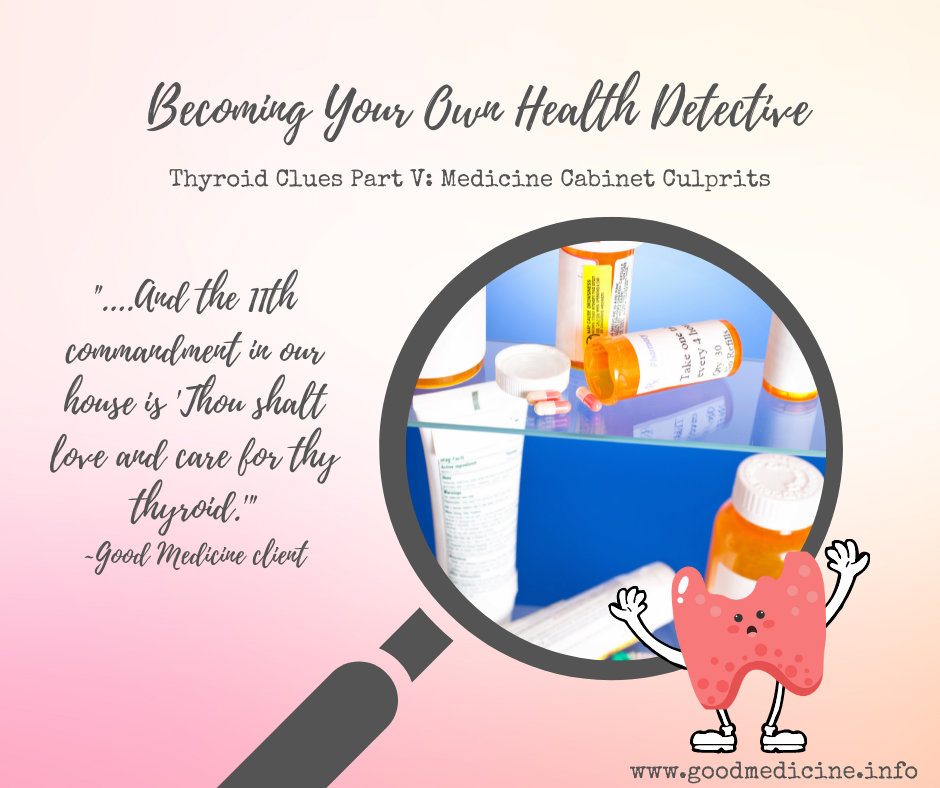
Remember the fable about the Princess and the pea
and the pea ? You may recall that the true princess felt the effects of a pea beneath twenty mattresses and had a terrible night’s sleep because of it. After all we’ve discussed, you well understand that the thyroid
? You may recall that the true princess felt the effects of a pea beneath twenty mattresses and had a terrible night’s sleep because of it. After all we’ve discussed, you well understand that the thyroid is the discerning princess in the body……it feels everything!
is the discerning princess in the body……it feels everything!
It’s hard to pin down exactly how many people use medication chronically in the USA, but a rough estimate in 2017 was 66%. (I believe that number has risen significantly since 2020, but to date, official data has not yet been released).
I will forever and always say that there is a time and a place for medication, but that it should be used as a last resort whenever possible. Pharmaceuticals by very definition are a toxin to the body. While they may be performing their “FDA approved task” within the body, behind the scenes they are likely setting up trip wires, snares, and grenades elsewhere. Many commonly prescribed medications are quietly sabotaging thyroid hormone function as they outwardly “play nice” in their appointed tasks of lowering cholesterol, quelling aches and pains, placating gastric reflux symptoms, smoothing out moody days, etc.
Certain medications have the ability to affect thyroid hormones in at least four ways:
1. Some may alter the actual production of thyroid hormones.
2. Some may affect the release of of thyroid hormones from the thyroid gland.
3. Some may affect how well thyroid hormone attaches to (or utilized) at receptor sites.
4. Some may interfere with the conversion of inactive T4 into active T3 in the liver
Who are the thyroid accosting culprits? As I hinted above, the gang is quite diverse. Nearly ⅓ of this gang of thieves bears a similar “tattoo”…….. They contain fluoride within their chemical structure. You’ll recall (hopefully!) that fluoride (and chlorine, another “tattoo” found in many medications) blocks iodine from its job helping the thyroid produce thyroid hormones. These small doses add up over time with chronic use medications.
As I hinted above, the gang is quite diverse. Nearly ⅓ of this gang of thieves bears a similar “tattoo”…….. They contain fluoride within their chemical structure. You’ll recall (hopefully!) that fluoride (and chlorine, another “tattoo” found in many medications) blocks iodine from its job helping the thyroid produce thyroid hormones. These small doses add up over time with chronic use medications.
Medications known to inhibit healthy thyroid function (in one of these four ways) with chronic use include:
(Note that this is a short representation of a very long list of medications!)
I am in no way inferring that you should stop taking medication that you may be currently on because it may be affecting your thyroid function. That is a conversation between you and your trusted health professional. According to an article by the Natural Health Research Institute, almost 75% of chronic illness can be improved or cured with improved lifestyle choices. Has your health professional talked to you about this as part of your treatment protocol?
Statistics like this are meant to empower you. Chronic disorders are generally where chronic medication use comes into play, and changing lifestyle habits can have a huge impact on health outcomes and on pharmaceutical needs.
Five significant ways your choices can impact your health include:
1. Reduce exposure to toxins (thank goodness for our YL Thieves Household Cleaner, essential oils that do “all the things” in a natural gentle way, Savvy Minerals cosmetics and the ART, Bloom, and Orange Blossom skin care lines!)
2. Making better food choices (and ditching the toxic processed foods)
3. Exercise. There is an exercise program / type out there that will work no matter what health situation you may be living with! (NingXia Nitro or Zyng 15-20 minutes prior to workouts elevates my gym workout routine!)
4. Sleep….Make sleep a priority. Improve your sleep hygiene habits! Some of my favorite sleep aids are YL’s Tranquil or RutaVala Roll-on…. Give ‘em a try and load your bedtime diffuser with oils like Cedarwood, Lavender, Peace & Calming, Frankincense, Orange )
5. Manage stress. Recall that chronic stress is as dangerous as a regular cigarette habit to the body. Even simply working on the four previous suggestions will have a profound impact on better management of stress.
In addition to making healthier lifestyle choices that lead to a healthier version of you (and protecting your thyroid in the process), here’s an added bonus: Annually, direct health care costs average $6032 out of pocket
in the process), here’s an added bonus: Annually, direct health care costs average $6032 out of pocket for an individual with one chronic disease (that number goes up with each additional disorder). Indirectly, chronic disorders also have a profound impact on education, occupation opportunities, income, and social interaction. If your health professional has not offered up these five recommendations as part of protocols for any chronic disorder you may have, they are working as a dis-ease maintenance advocate instead of that as a healer. Ultimately though, it’s our personal responsibility to be our own advocates and in doing so, choosing whether to live in a space of dis-ease maintenance or healing. Care for that thyroid “princess” within your personal kingdom friends! It’s often the first organ in the body to recognize that something is amiss.
for an individual with one chronic disease (that number goes up with each additional disorder). Indirectly, chronic disorders also have a profound impact on education, occupation opportunities, income, and social interaction. If your health professional has not offered up these five recommendations as part of protocols for any chronic disorder you may have, they are working as a dis-ease maintenance advocate instead of that as a healer. Ultimately though, it’s our personal responsibility to be our own advocates and in doing so, choosing whether to live in a space of dis-ease maintenance or healing. Care for that thyroid “princess” within your personal kingdom friends! It’s often the first organ in the body to recognize that something is amiss.
xoxo~ liz
